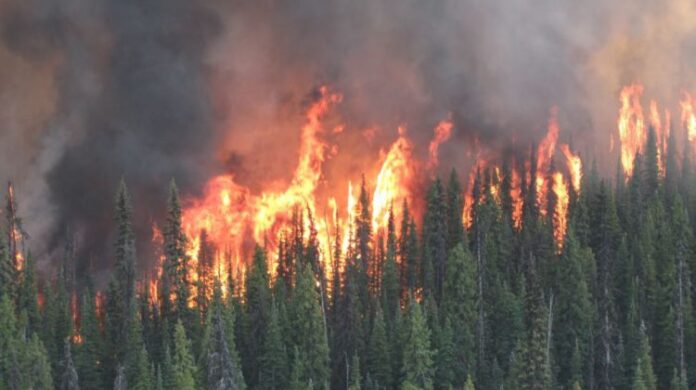Heavy rainfall, forest fires, widespread smoke and sudden temperature changes are at the top of Environment Canada’s list of the biggest weather events of the year.
Speaking to reporters on Wednesday, senior climatologist David Phillips says the Canadian landscape took a big hit from extreme weather and climate-related disasters.
“You’ve seen the scenes, scorched earth, charred buildings, smoking tree trunks, debris flows everywhere from major storms, dry riverbeds, fields and neighbourhoods underwater for a long time and that hellish orange hazy sky that seemed to permeate the air,” said Phillips.
“This is what climate change looks like and it’s not pretty. There were no province or territory that was immune, no Canadians untouched by the extreme weather of this year.”
The list kicks off with a tornado about 70 km from Calgary on Canada Day, generating winds up to 275 km/h. Phillips said it was the most powerful tornado in 35 years.
Quebec’s very wet July rolled in at No. 9 along with cold spells across the country despite it being a warm year at No. 8.
No. 7 was an ice storm that hit Montreal in April causing $330 million in damage and following was Hurricane Lee with its powerful winds.
Dry conditions in the west and wet conditions in the east came in at No. 5 while the fatal deluge in Nova Scotia was fourth. Coming in at No. 3 was the hottest year not only in Canada but also around the world. It was the warmest year in 76 years for our country; even the northern parts saw temperatures hit 38 degrees.
Taking the second spot on the leaderboard was the enormous quantity of smoke from massive wildfires that spread across the country, into the U.S. and would also make it to countries like Greenland and Germany.
“Two-thirds of the people in the Northwest Territories left home,” said Phillips. “Canadian cities, many of them, competed for the most polluted city in the world. Calgary, Montreal, Ottawa, Toronto at times.”
Phillips adds there were over 1,000 hours of smoke in the skies in northern Saskatchewan and B.C.
Taking the top spot were the unprecedented wildfires, burning mass quantities of forest including five per cent of the boreal forest.
Phillips added the fires started early this year and stayed late to create the brutal fire season for the country. He says it was two and a half times worse than the previous worst year.
“Fires were everywhere and that was the difference this year. We were fighting fires in the north, the west and the east, sometimes all at once,” said Phillips. “June 6, there were out-of-control fires in all the provinces except for Prince Edward Island and Nunavut.
“How do you move men and women and machinery and hoses when you’re dealing with fire fronts in so many areas?”
While lightning was down this year, Phillips says the Donnie Creek fire in northern B.C. was caused by a few small strikes.
Looking back on the year, Phillips says the evidence of climate change is made even more real by the disasters and shows what could be in store for the future.
“If the climate continues to warm at the hands of human beings, I think we should expect to see more wildfires. Larger, and burning more area,” said Phillips.
“I think the evidence is clear and consistent and more certain that human-caused climate change is making weather extremes, more extreme and leading to more catastrophes. In the past it used to be an extreme and then separated by decades of normal weather.”




